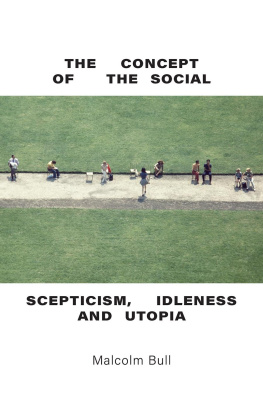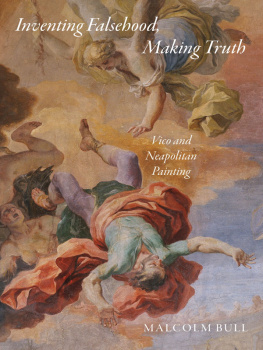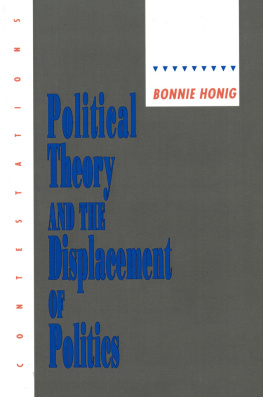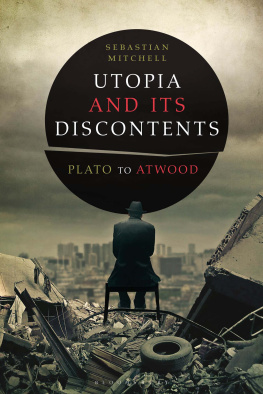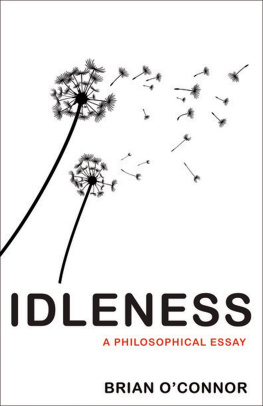
The Concept of the Social
The Concept
of the Social
Scepticism, Idleness
and Utopia
Malcolm Bull

First published by Verso 2021
Malcolm Bull 2021
Chapter 2, New Left Review 45, MayJune 2007; 3, New Left Review 35, SeptOct 2005; 4, New Left Review 40, JulyAug 2006; 5, New Left Review 100, JulyAug 2016; 6, Katrina Forrester and Sophie Smith, eds, Nature, Action and the Future, Cambridge 2018
All rights reserved
The moral rights of the author have been asserted
1 3 5 7 9 10 8 6 4 2
Verso
UK: 6 Meard Street, London W1F 0EG
US: 20 Jay Street, Suite 1010, Brooklyn, NY 11201
versobooks.com
Verso is the imprint of New Left Books
ISBN-13: 978-1-84467-293-6
ISBN-13: 978-1-83976-430-1 (US EBK)
ISBN-13: 978-1-83976-701-2 (UK EBK)
British Library Cataloguing in Publication Data
A catalogue record for this book is available from the British Library
Library of Congress Cataloging-in-Publication Data
A catalog record for this book is available from the Library of Congress
Typeset in Fournier by MJ & N Gavan, Truro, Cornwall
Printed and bound by CPI Group (UK) Ltd, Croydon CR0 4YY
Contents
This book has been some time in the making, and the essays it contains have been shaped by many hands other than my own. Several were originally presented as invited papers: appeared in Nature, Action and the Future, published by Cambridge University Press and edited by Katrina Forrester and Sophie Smith.
I would particularly like to thank Steven Lukes and Amia Srinivasan for their comments on , and Perry Anderson, who read the entire manuscript. At Verso, it has been a pleasure to work with a succession of editors: Tom Penn, Leo Hollis and Tom Hazeldine (who finally saw the book to press). My greatest debt is, as always, to Jill Foulston.
The starting point for this book is the uncertainty and incompleteness of our knowledge, and our knowledge of politics in particular. It does not set out to make that knowledge any more secure, but rather to explore ways in which uncertainty might contribute to, rather than impede, our collective emancipation.
Progressive politics often seems wedded to the idea that knowledge and knowledge-based action provide the only route to a utopian future. But experience suggests that theres more that we dont know than we do, and that while some outcomes are the intended consequences of our actions the majority are not. And that even if thats not the case in our most immediate experience and actions, it becomes increasingly true as the frame of reference expands. It follows from this that a mild to moderate degree of scepticism is probably warranted when it comes to questions about the ultimate goals of politics and how to achieve them.
From such seemingly modest observations, powerful currents of anti-utopian thought were developed in the mid-twentieth century by Oakeshott and Hayek among others. Those ideas have transformed our world. This book is a response to these thinkers, not in the sense that it engages directly with their arguments, but in that it starts from similar premisses and heads in another direction. On the one hand, it assumes that what we need to be freed from is not our ignorance, but what we think we know already; on the other, it accepts that our world is made through collective action. It therefore argues that collective emancipation is possible, and that it is achieved through the unmaking of the world.
The name that is given to this utopian possibility is the social. The term is taken from Hannah Arendt who, like many other critics of modernity, noticed that the world was in the process of being unmade without anyone having intended to dismantle it. In what follows, the social is taken not as a symptom of political and cultural decline, but rather as an intimation of utopian possibility. If we need to free ourselves from the things that we ourselves have made, we may yet achieve emancipation through the unintended consequences of our own (in)action. Any specifiable state of the world contains the promise of a greater degree of spontaneous disorder, and a degree of scepticism about politics suggests we might allow ourselves to relax enough to achieve it. Like many works of political theory, this book is much concerned with nature and the state. But rather than being an argument about how the political state can arise from the state of nature, it is concerned with the reverse dynamic: how the political state can be returned to nature.
Antarctic explorers classify their journeys according to whether they are expeditions (to the South Pole and back), crossings (from one side to the other), or circumnavigations (around the pole), and also whether they are full (e.g., starting at the coast and returning to it) or partial (starting and/or ending somewhere further inland). Its a classification system that can easily be applied to intellectual exploration as well. And in these terms, The Concept of the Social is not a full expedition in that it does not start from some notionally neutral premiss outside its subject matter and keep on arguing until it reaches its goal. Instead, it offers a series of overlapping and intersecting paths across the same territory. Some are circumnavigations, circling the pole without reaching it. Most are partial crossings, picking up a line of argument, heading directly south and not stopping until some way beyond the pole itself. And some are reverse crossings, which begin where someone else has stopped and retrace their steps in the opposite direction. But as in all polar explorations, each of these paths crosses or circles around the same point, and all share the same orientation and purpose.
If traced on a map, these paths might look something like a net, not perhaps one so tightly drawn as to trap the elusive concept of the social, but maybe one with enough meshing to retain it for a while before it slips away. The opening chapter draws on social ontology to argue that scepticism has serious yet positive consequences for politics, and that a politics of scepticism can unmake the world and bring human and non-human nature into alignment. That alignment is potentially to be found in the space that , Vectors of the Biopolitical, sketches the routes through which the political and the natural might converge there. The following three chapters are concerned more specifically with questions of political agency and explore the relationship between the political and the social, state and society. In particular, they highlight ways in which unintended consequences may create, not a form of spontaneous order, but the kind of spontaneous disorder that Hegel identified with civil society and Machiavelli with corruption, and which turns out to be potentially far healthier than either allows. Machiavelli suggests that one of the things that leads to corruption is idleness, and in Slack it is possible to see this argument unfold in the debate about unused resources in twentieth-century environmentalism. The final chapter argues that increasing the unused potential of the human race may be the best route to a natural cosmopolitanism.
Is Scepticism Possible?
What can we know to be true? What is the right way to live? What sort of society is best?
Next page
